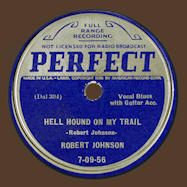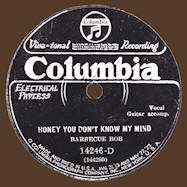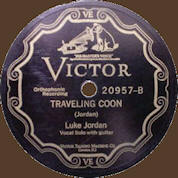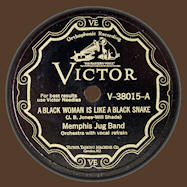
Painting © 2004 Loz
Arkle
Website
© Copyright 2000-2011 Alan White - All
Rights Reserved
Site optimised for Microsoft Internet Explorer
British Superstitions and the Blues |
||||||||||||||||||||||||||||
|
Introduction If, as I have stated, in a previous essay "The English Music Hall Connection" that it was probably the link with the Blues which was the farthest removed from Africa, then this one is arguably the closest to that continent. Indeed, in the areas of hoodoo and conjurers there are obviously overlaps. But traditionally these latter phenomena have been associated only with West Africa and to a lesser degree, Cuba. I intend to show that there was a parallel tradition amongst rural communities in Britain up until at least the turn of the century, lasting well into the 1930's. This tradition goes back to medieval times when magicians and witches abounded. The latter concept of course was unknown in Africa [See Addendum below]. Another phenomenon which has strong European ties is that of the hell hound. I will be looking at a variety of examples in Britain which inspired Mississippi Blues man Robert Johnson, to record his famous "Hell Pound On My Trail" in 1937; blues which evokes an almost "Satanic" atmosphere. The motif is almost unique in the recorded Blues of the pre-war era (1920-1943). I maintain that many superstitions, beliefs and customs were transported from the British Isles over to the southern U.S.A. in the nineteenth century, and earlier. Some underwent modifications or even a reversal! But there are many instances that appear in black culture almost intact. For example, on the subject of traditional signs of Christmas in the 19th. century in the English countryside, Margaret Baker reports "Northern farmhouse servants chose a slow-burning log, for while it burned they had ale and cider with their meals."(1). This was referring to the yule-log blaze on Christmas Eve. Baker adds "the custom was carried to the southern United States by English settlers and the slaves searched the woods for the greenest logs they could find to prolong festivities." (2). Thus revealing one of the possible means of transmitting superstitions from Britain of earlier times to the Blues in the Deep South in the first years of the 20th. century. I will be citing examples in the Blues and in working-class black culture of the U.S. (from whom the Blues originated) which show direct influence in their superstitions and beliefs from this side of the Atlantic, and were also carried to the southern U.S.A. in much the same manner. For whatever reasons, it seems that to varying degrees "rural people have always been superstitious."(3). The reason, for the most part, why British beliefs had such an impact on the Blues, lies in the socio-historical fact of colonization and the subsequent isolation of much of the rural South from mainstream America, which was hell-bent on industrialisation. Not only the adopted language of slaves, seventeenth century English but often British societal concepts helped to forge a strong non-African link with the Blues. © Copyright 1992 Max Haymes Addendum: Witches not known in Africa Of course the witch was/is present in West African cultures and more usually as a 'witch doctor'. In Nigeria 'Witches (amazu) and wizards (ogbama) have ... animal counterparts, and so assume the forms of owls, lizards, vultures, and numerous species of nightbirds. (p.278. 'Drums & Shadows'. Mary Granger. (Ed.) [Forgotten Books.] Rep. 2007. 1st. pub. 1940). See Lucille Bogan, Ma Rainey, et al. for blues that include these animals. This is from a quote used by Granger in 'Law And Authority In A Nigerian Tribe'. C.K. Meek. [Oxford University Press. London. N.Y.] 1937. Nevertheless, my original statement had in mind the European concept of an old woman with broom, etc. being a witch. Ones in W. Africa generally appear to have been males. Whereas in the 19th. Century in US - certainly in New Orleans - voodoo doctors were usually women." Max Haymes 1st.
December 2011 Notes:
__________________________________________________________________________
Back
to essay overview
Website © Copyright 2000-2011 Alan White. All Rights Reserved. |
||||||||||||||||||||||||||||












